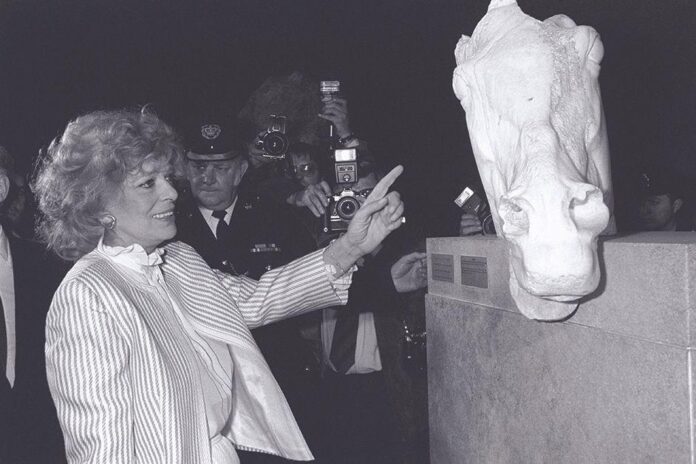Newly declassified UK government documents reveal that the Foreign Office was dismissive of the British Museum’s lobbying to retain the Parthenon Marbles in 1983, the year when a formal claim was first lodged.
The future of the Marbles became a major issue during a visit to London by the then Greek culture minister, the internationally famed actor Melina Mercouri. Government papers record that her “colourful personality and romantic cause attracted considerable interest and media coverage”.
Foreign Office staff were worried that Mercouri was winning the debate: “On occasions her dramatic flourishes verged on the histrionic, but she undoubtedly stole the limelight from her protagonist, David Wilson [director] of the British Museum”. This was particularly evident during “a televised exchange of views between the two on a sofa” at London’s Institute of Contemporary Arts, following a lecture that she delivered there on 22 May 1983.
Winning the argument “hands down”
The Foreign Office recorded that Mercouri argued that the Marbles “are an integral part of a monument that represents the national spirit of Greece”. Wilson responded that they are part of a museum which is a unique international institution that “should not be dismembered”. But the officials concluded that Mercouri “won the argument hands down”.
The British ambassador in Athens, Peregrine Rhodes, then chipped in, adding that in Greece “arguments put by Wilson are likely to be counter productive”. Just before Mercouri’s visit the ambassador had argued that the UK government should adopt a tough line: “To fudge the issue can only store up trouble for the future”.
The UK’s relations with the European Community (forerunner of the European Union) were being threatened by the Marbles dispute, which worried Burke Trend, the British Museum chair. He warned the Foreign Office that if the museum trustees were advised by the government that “they ought to do something to accommodate” the Greeks, because of their membership of the European Community, this would create “a very difficult situation”.
The Foreign Office’s head of cultural relations, John Macrae, added his views: “The problem seemed to me to be one that would be with us for some time to come. We had to live with it and as far as possible contain it”. That was in June 1983, exactly 40 years ago.
Ineffectual
The British Museum’s curator of classical antiquities, Brian Cook, appeared in the Foreign Office’s eyes to be as ineffectual as his director. At another meeting during Mercouri’s visit, Cook made “a disappointing and pedantic defence, aimed at proving that Elgin was not guilty of vandalism and that the Parthenon was a symbol of Athenian imperialism, not Greek freedom and nationhood”. Cook referred to the sculptures as “the Elgin Marbles” (and wrote a museum book with that title, which was reprinted until 2005), rather than as what are now universally termed the Parthenon Marbles.
Macrae had commented that “it is a pity that the BM [British Museum] does not make a more effective defence of their claim to the Marbles”. He felt that the matter was a moral and political one for the British people to answer through Parliament: “The BM should remember that what Parliament giveth, Parliament taketh away.”
Legislative ban
Under the 1963 British Museum Act, approved by Parliament and still remaining in force, the trustees are not allowed to deaccession from the collection, a prohibition still used to reject Greek restitution claims.
In May 1983, immediately before Mercouri’s arrival, Hugh Jenkins, a former Labour arts minister, had proposed an amendment of the 1963 act to permit deaccessioning. This was opposed by the Conservative government and the amendment failed. As Paul Channon, then arts minister, wrote in a note in the Foreign Office file: the return of the Marbles would “start a process of piecemeal break-up of the British Museum collections”.
It was five months after Mercouri’s visit that the Greek government made a formal claim for the Parthenon Marbles. The controversy has certainly not gone away. Today, the museum continues to stress that it cannot deaccession because of the 1963 act.
No plans for change
The prime minister, Rishi Sunak, said on 13 March, when questioned about the Marbles: “The UK has cared for the Elgin Marbles for generations. The collection of the British Museum is protected by law, and we have no plans to change it.”
Meanwhile, the British Museum trustees have recently shifted their position and are now more amenable to a long-term loan (but not legal
restitution) of at least some of the Marbles, in return for reciprocal loans of Greek antiquities to London. This is being proposed by George Osborne, chair of the trustees and a former Chancellor of the Exchequer.
Osborne said in February: “We’re talking to the Greek government … about a new arrangement.” He added that the 1963 act prevents artefacts being deaccessioned, commenting that a change in the law is “beyond my authority”. A British Museum statement confirms that it has “called for a new Parthenon partnership with colleagues in Greece and constructive discussions are ongoing”.

























